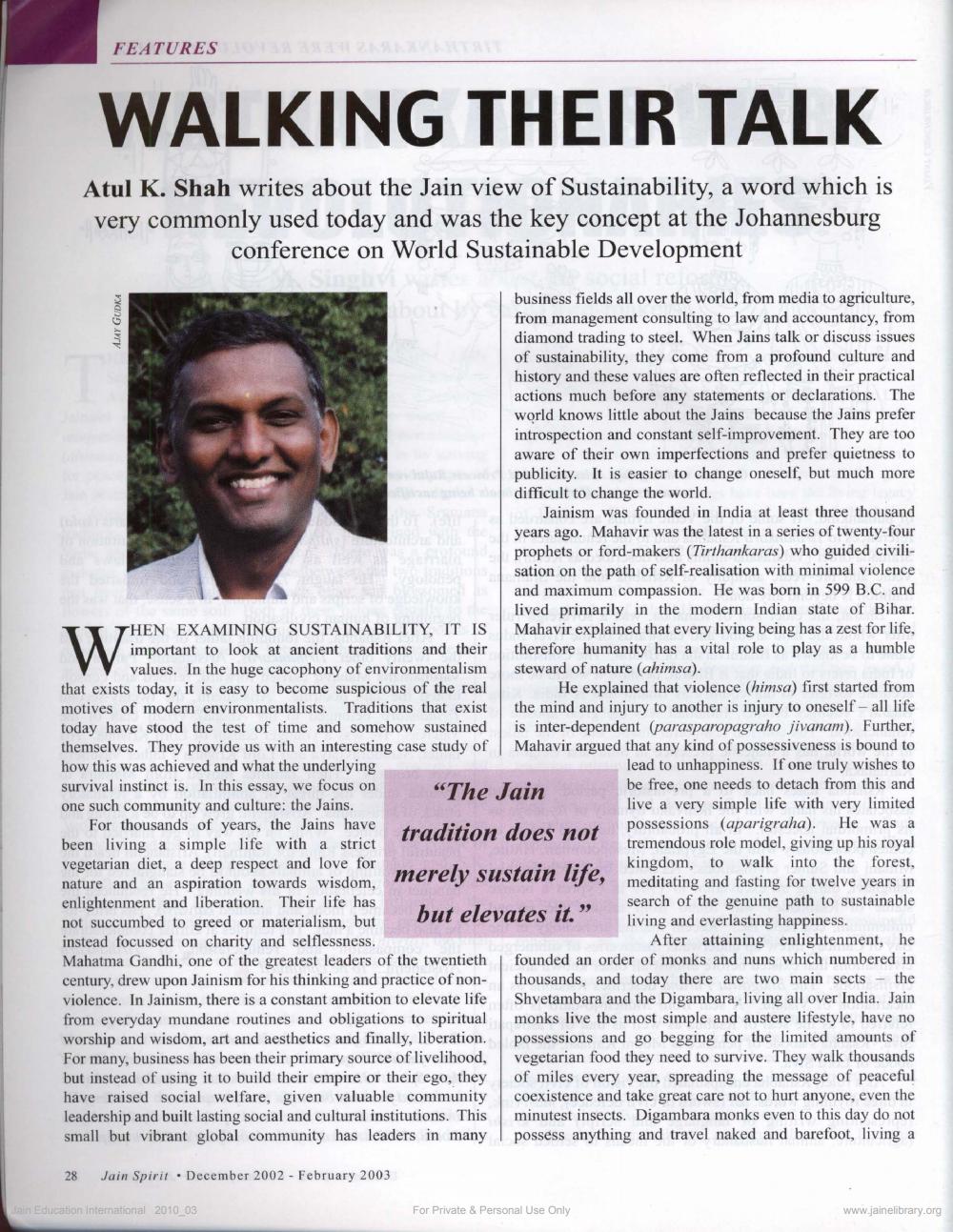________________
FEATURES
WALKING THEIR TALK
Atul K. Shah writes about the Jain view of Sustainability, a word which is very commonly used today and was the key concept at the Johannesburg conference on World Sustainable Development
28
AJAY GUDKA
Jainism was founded in India at least three thousand years ago. Mahavir was the latest in a series of twenty-four prophets or ford-makers (Tirthankaras) who guided civilisation on the path of self-realisation with minimal violence and maximum compassion. He was born in 599 B.C. and lived primarily in the modern Indian state of Bihar. Mahavir explained that every living being has a zest for life, therefore humanity has a vital role to play as a humble steward of nature (ahimsa).
W
THEN EXAMINING SUSTAINABILITY, IT IS important to look at ancient traditions and their values. In the huge cacophony of environmentalism that exists today, it is easy to become suspicious of the real motives of modern environmentalists. Traditions that exist today have stood the test of time and somehow sustained themselves. They provide us with an interesting case study of how this was achieved and what the underlying survival instinct is. In this essay, we focus on one such community and culture: the Jains.
He explained that violence (himsa) first started from the mind and injury to another is injury to oneself- all life is inter-dependent (parasparopagraho jivanam). Further, Mahavir argued that any kind of possessiveness is bound to lead to unhappiness. If one truly wishes to be free, one needs to detach from this and live a very simple life with very limited possessions (aparigraha). He was a tremendous role model, giving up his royal kingdom, to walk into the forest,
"The Jain
tradition does not
For thousands of years, the Jains have been living a simple life with a strict diet, a deep respect and love for
nature and an aspiration towards wisdom, merely sustain life, meditating and fasting for twelve years in
but elevates it."
search of the genuine path to sustainable living and everlasting happiness.
After attaining enlightenment, he founded an order of monks and nuns which numbered in thousands, and today there are two main sects - the Shvetambara and the Digambara, living all over India. Jain monks live the most simple and austere lifestyle, have no possessions and go begging for the limited amounts of vegetarian food they need to survive. They walk thousands of miles every year, spreading the message of peaceful coexistence and take great care not to hurt anyone, even the minutest insects. Digambara monks even to this day do not possess anything and travel naked and barefoot, living a
bo
enlightenment and liberation. Their life has not succumbed to greed or materialism, but instead focussed on charity and selflessness. Mahatma Gandhi, one of the greatest leaders of the twentieth century, drew upon Jainism for his thinking and practice of nonviolence. In Jainism, there is a constant ambition to elevate life from everyday mundane routines and obligations to spiritual worship and wisdom, art and aesthetics and finally, liberation. For many, business has been their primary source of livelihood, but instead of using it to build their empire or their ego, they have raised social welfare, given valuable community leadership and built lasting social and cultural institutions. This small but vibrant global community has leaders in many
Jain Spirit December 2002 February 2003
Jain Education International 2010_03
or Bra
business fields all over the world, from media to agriculture, from management consulting to law and accountancy, from diamond trading to steel. When Jains talk or discuss issues of sustainability, they come from a profound culture and history and these values are often reflected in their practical actions much before any statements or declarations. The world knows little about the Jains because the Jains prefer introspection and constant self-improvement. They are too aware of their own imperfections and prefer quietness to publicity. It is easier to change oneself, but much more difficult to change the world.
For Private & Personal Use Only
www.jainelibrary.org




